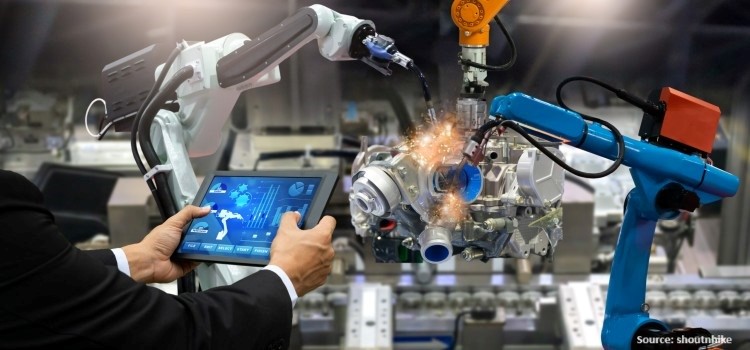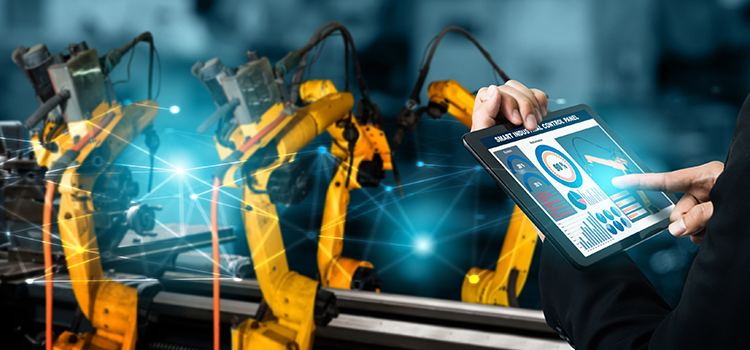
U.S. Industrial Process Automation Market by Component (Manufacturing Execution System (MES), Distributed Control System (DCS), Programmable Logic Control (PLC), Supervisory Control & Data Acquisition (SCADA), by End user (Oil & Gas, Chemicals & Refining, Energy & Power, Pulp & Paper, Metals & Mining, Pharmaceutical, Cement & Glass, and Others) – Opportunity Analysis and Industry Forecast, 2023–2030
Industry: Semiconductor & Electronics | Publish Date: 08-Nov-2023 | No of Pages: 118 | No. of Tables: 90 | No. of Figures: 34 | Format: PDF | Report Code : N/A
Market Definition
U.S. Industrial Process Automation Market was valued at USD 11.62 billion in 2022, and is predicted to reach USD 17.40 billion by 2030, with a CAGR of 4.27% from 2023 to 2030. Industrial process automation refers to the use of computer technology, along with hardware to control & monitor industrial processes such as inventory management, manufacturing, and production of goods.
It involves the integration of various technologies and systems, such as sensors, programmable logic controllers (PLCs), human-machine interfaces (HMIs), and supervisory control & data acquisition (SCADA) systems, to streamline and optimize production processes including quality control, assembling, testing & inspection, packaging & labeling.
Process automation is applied to a wide range of industries, including oil & gas, chemical processing, food & beverage, and pharmaceuticals, among others. The goal of process automation is to improve efficiency, quality, and safety while reducing costs & minimizing human error.
Thus, industrial process automation plays a significant role in modern manufacturing & production, enabling companies to operate more efficiently, produce higher-quality products, and create safer working environments for their employees when compared to traditional manual methods.
Driving Growth in US: IoT, AI, and Sustainability Fuel Demand for Automation Solutions
The U.S. is one of the leading adopters of IoT and AI technologies, which are crucial components of Industry 4.0. The growing adoption of these technologies in industries including automotive and pharmaceuticals, among others across the country is increasing the demand for industrial process automation solutions in the US.
In addition, the US companies are increasingly focused on reducing their energy consumption and carbon footprint through the implementation of sustainable production practices and energy-efficient technologies. This focus has led to a growing demand for energy-efficient automation solutions. Thus, contributing significant growth for the industrial process automation market.
Transforming US Automotive Production: The Role of Automation in Efficiency and Quality
Automotive manufacturing, being one of the largest and most intricate sectors, encompasses a diverse array of processes that stand to gain from automation. This includes tasks such as streamlining assembly line operations, enhancing quality control measures, and optimizing the management of the supply chain. Thus, it is expected to drive the growth of the industrial process automation market.
Automated systems are also employed for tracking inventory levels, refining production schedules, and ensuring the timely delivery of parts and components to the assembly line. According to the U.S. Bureau of Labor Statistics, the sales of electric vehicle in the U.S. is expected to reach 40%of total passenger car sales by 2030.
Non-Standardized Processes Impede Market Growth in the United States.
The absence of standardized practices poses a notable challenge that could impede the expansion of the industrial process automation market. When industry standards are lacking, manufacturers may develop exclusive systems that prove challenging to replace or upgrade. Consequently, this situation can result in vendor lock-in, as businesses become heavily reliant on a specific vendor's technology, restricting their capacity to collaborate with different vendors.
Vendor lock-in can result in increased expenses, reduced adaptability, and limited opportunities for innovation, all of which can have adverse effects on the industrial process automation market's growth. Companies might be reluctant to invest in automation systems when they harbor concerns about being tied to a particular vendor's technology, ultimately hampering the market's development.
Seizing Opportunities: The Rising Adoption of Cloud-Based Automation Solutions
The increasing adoption of cloud-based automation solutions presents a significant growth opportunity for the industrial process automation industry. These solutions offer several benefits such as increased efficiency, productivity, and profitability for businesses. They can be easily scaled up or down, making them suitable for businesses of all sizes.
Additionally, cloud-based solutions provide greater control and visibility into industrial processes, and can significantly reduce the costs associated with maintaining and upgrading hardware, software, and infrastructure. Cloud-based automation solutions can significantly reduce the costs associated with maintaining & upgrading hardware, software, and infrastructure.
As a result, companies can focus on their core competencies and invest resources in other areas of their business. With several companies investing in cloud-based solutions for managing and utilizing 3D data obtained from reality capture devices, it is evident that there is a growing interest in adopting these technologies.
For instance, in January 2022, Accenture strategically invested through Accenture Ventures, in Cintoo, a provider of cloud-based solutions to manage and utilize 3D data obtained from reality capture devices. As a result, continued growth and innovation in the industrial process automation industry is expected in the future.
Competitive Landscape
The U.S. industrial process automation industry includes several market players such as Hitachi Ltd, Yokogawa Electric, Siemens AG, Mitshubishi Electric Corporation, Honeywell International Inc., ABB Ltd, Toshiba Corporation, Emerson Electric Co., Rockwell Automation Inc, Omron Corporation, and Fanuc Corporation, Schneider Electric SE, Endress+Hauser, Valmet OYJ, and Dwyer Instruments Inc.
U.S. Industrial Process Automation Market Key Segments
By Component
-
MES
-
Hardware
-
Software
-
Services
-
-
DCS
-
Hardware
-
Software
-
Services
-
-
PLC
-
Hardware
-
Software
-
Services
-
-
SCADA
-
Hardware
-
Software
-
Services
-
-
Field Instruments
-
Industrial Robots
-
Human Machine Interface
-
Process Analyzers and Drives
By End User
-
Oil and Gas
-
Chemicals and Refining
-
Energy and Power
-
Pulp and Paper
-
Metals and Mining
-
Pharma
-
Cement & Glass
-
Others
REPORT SCOPE AND SEGMENTATION:
|
Parameters |
Details |
|
Market Size in 2022 |
USD 11.62 Billion |
|
Revenue Forecast in 2030 |
USD 17.40 Billion |
|
Growth Rate |
CAGR of 4.27% from 2023 to 2030 |
|
Analysis Period |
2022–2030 |
|
Base Year Considered |
2022 |
|
Forecast Period |
2023–2030 |
|
Market Size Estimation |
Billion (USD) |
|
Growth Factors |
Growing adoption of technologies such as IoT and AI. The presence of automotive manufacturing sectors. |
|
Companies Profiled |
15 |
|
Market Share |
Available for 10 companies |
|
Customization Scope |
Free customization (equivalent up to 80 working hours of analysts) after purchase. Addition or alteration to country, regional, and segment scope. |
|
Pricing and Purchase Options |
Avail customized purchase options to meet your exact research needs. |
KEY PLAYERS
-
Hitachi Ltd
-
Yokogawa Electric
-
Siemens AG
-
Mitshubishi Electric Corporation
-
Honeywell International Inc.
-
ABB Ltd
-
Toshiba Corporation
-
Emerson Electric Co.
-
Rockwell Automation Inc
-
Omron Corporation
-
Fanuc Corporation
-
Schneider Electric SE
-
Endress+Hauser
-
Valmet OYJ
-
Dwyer Instruments Inc.




 Speak to Our Analyst
Speak to Our Analyst
































